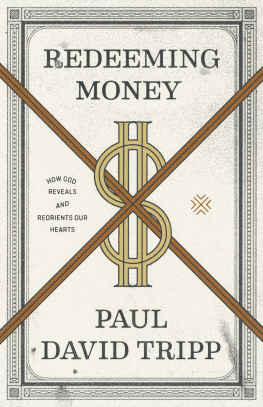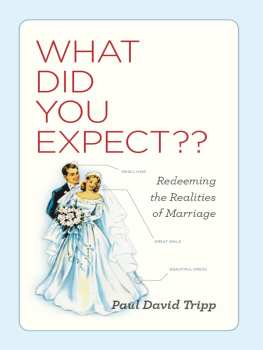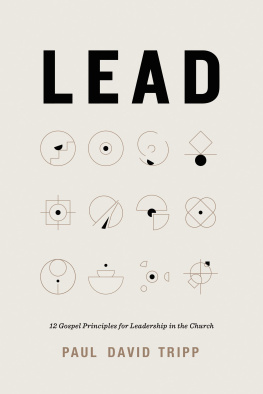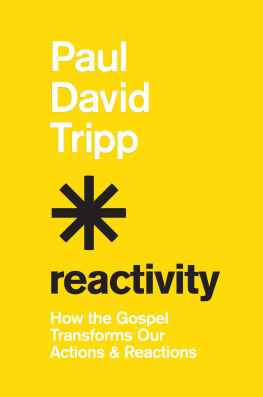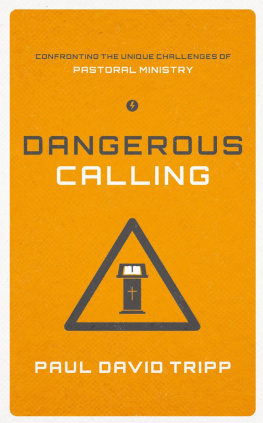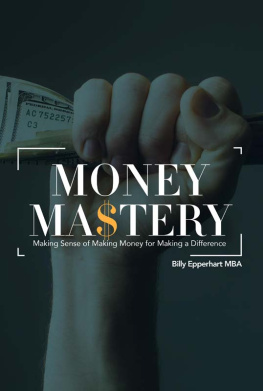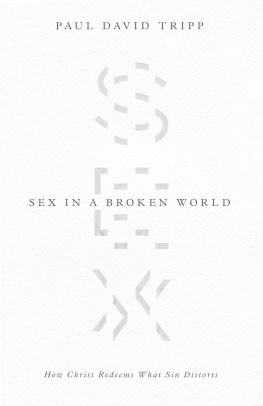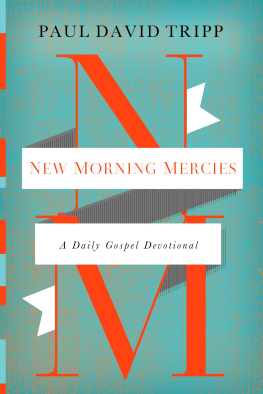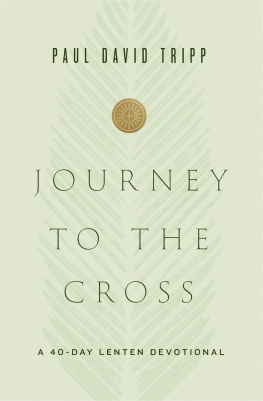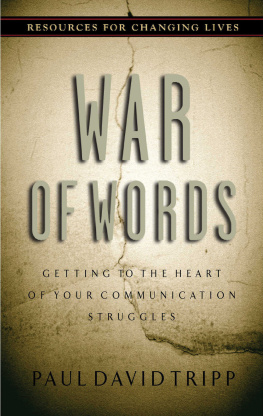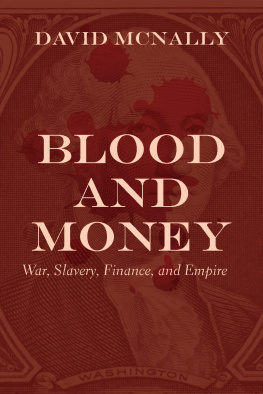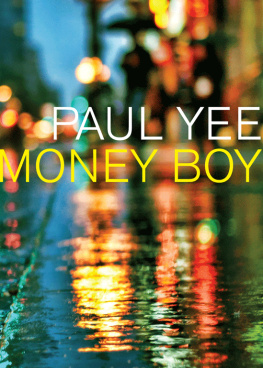Table of Contents
Landmarks
They were living under crushing debt. It was all so complicated that that day in my office when they told me their story, I didnt know what to say. They were the living familial case study of what the love of money looks like. Both husband and wife had been married before, so theirs was a blended family. They had together raised materialistic, entitled, and demanding children. Its no wonder they had, because they both thought they deserved the good life and were quite willing to spend to get it. And spend they did! There seemed to be no end to their cycle of desire, expenditure, possession, debt, and dissatisfaction. They loved money for how it made them feel. They loved money for what it could get them. They loved money for how it made them look in the eyes of others. They loved money for its power. They loved money because they thought it meant God loved them. They loved money for what it could buy them out of. They loved money!
When I met them, their house of self -oriented, materialistic dreams had begun to crash down. As I listened to their story, it became very clear that somewhere along the way they had gone money insane. They seemed almost incapable of holding onto their money. They invented ways of spending their next dollar even before it had been earned. Because it wasnt just goods and pleasure mounting up but debt as well, they decided they had to do something. So they took out a second mortgage on their second home. Borrowing more to get out of debt was not a good solution in the first place, but guess what they did with their newfound thousands? They put it in their ATM account. Yes, you read it right. They mortgaged their house and used the proceeds to fund more reckless spending. In fact, in celebration of their new cash flow, the husband went out and bought his wife a $3,500 ring. They were money drunk, money addicted, and money mad, but they seemed not to know it.
Because of the pressures, the husband and wife were tense, irritable, and in almost constant conflict with each other. The children were in a constant contest to see who would end up with the biggest pile of stuff. They were demanding, complaining, and critical. The husband was more frequently absent from home because he couldnt deal with the conflict, and the wife, feeling abandoned, began to think about how to get out of her marriage. With all the division, the semblance of an intentional spiritual life went out the window. God had long since been replaced as the object of their practical worship. Church was no longer on the weekly calendar, and giving to Gods work, well, there simply wasnt enough money. For them, the love of money was rapidly becoming the source of all kinds of evil.
How Is Love of Money a Root of Evil?
When you first read it, it doesnt seem that it could be true. It seems as if there are all kinds of things more evil than loving money. And on the surface it doesnt seem that loving money could lead to all other kinds of evil. So it is important to take time to unpack the spiritual dynamics of the love of money. Lets examine 1 Timothy 6:610:
Godliness with contentment is great gain, for we brought nothing into the world, and we cannot take anything out of the world. But if we have food and clothing, with these we will be content. But those who desire to be rich fall into temptation, into a snare, into many senseless and harmful desires that plunge people into ruin and destruction. For the love of money is a root of all kinds of evils. It is through this craving that some have wandered away from the faith and pierced themselves with many pangs.
If you read those words carefully, you begin to get a clue that the love of money is connected to things significantly bigger than money. Consider the profound connections Paul makes in this provocative little passage, bringing out once again what weve been considering all through this book. The love of money is fundamentally not an overspending problem; it is a contentment problem (Godliness with contentment is great gain). The love of money is also an identity problem (... for we brought nothing into the world). The love of money is a fallen world problem (... fall into temptation). And the love of money is a worship problem (But those who desire to be rich...). The root system of the love of money runs deeper and wider through the soil of the human heart than we tend to think.
Paul begins his discussion with contentment because the roots of our problem with money are found there. Discontentment is the soil in which the love of money grows. I dont think that we value - rate discontentment properly. Discontentment seems like an inconsequential sin. For most of us, it means little more than wishing we had more, and the only negative aspect of our complaining is that we wont be the life of the party. But the discontented person lacks something more fundamental and life - shaping than happiness; the discontented person lacks humility. He really does think of himself more highly than he ought to think. He really is convinced that he deserves what he doesnt actually deserve. He lives as though he is entitled to things to which hes not entitled, and because he feels entitled, he thinks its his right to demand them. He cant handle the guy next to him having what he has been unable to acquire, and his discontentment will ultimately bring him to question the goodness of God. Discontentment is very significant.
The lack of humility that fuels discontentment is about more than being a bit full of ourselves and bragging too much; its about a heart that has been captured by self -glory. Its life has turned inward, when we have been created to live an upward (love for God) and an outward (love for neighbor) life. It really is making it all about us. It is a lifestyle shaped by the unholy self - love trinity: my wants, my needs, and my feelings. It is about making my personal definition of happiness the most important ethical commitment of my life. It means that my every day is spent in the pursuit of my pleasure, my comfort, and my ease. It is me in the center of my world. It is I love me, and I have a wonderful plan for my life.
Because I am in the center of my world, and because that means that God isnt, money cant possibly be in its proper place. You see, if God is in the center of my world and I acknowledge that I was created to live for him, then I look to him to provide in his grace what I need, to be what Im supposed to be, and to do what I was designed to do. But if I am at the center, if it really is all about me, then money can become my surrogate, my replacement savior. Its worth stressing again that when our happiness is at the center and the Creator is out of the picture, then we look to creation for our happiness. So money becomes the savior that delivers all the things we think will bring us joy. No longer living for Gods glory but obsessed by our own, we daily ask money to save us from the want and discomfort that we view as the principle evil to avoid.
Would you not agree that living for self rather than living for God is at the core of all kinds of evil? Well, that is exactly what the love of money is all about. When I rather than God am in the center of my world, I live an entitled, self -focused, demanding life marked by the discontentment that selfishness always produces. Self - glory is at the center of the original sin in the garden of Eden, and it is the soil in which all sin has grown ever since.
But there is more. We noted earlier how identity factors into our issues with money, so the love of money is also an identity problem. The love of money is connected to forgetting who we are and what our life is about. Since we have been created for a life beyond this one, hardwired for forever, it makes no sense to view life as being all about the pleasures, possessions, experiences, and power of the moment. It is true: we brought nothing in, and well take nothing out, and when were making our exit, what we have amassed wont do much or mean much.

